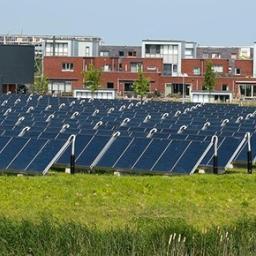New UN report calls for wide-ranging innovations and integrative policies
The world is not on track to achieve internationally agreed environmental targets, such as those outlined in the Sustainable Development Goals (SDGs) and the Paris Agreement. To get on track, wide-ranging innovations in production and consumption are required, combined with integrated policy approaches. These are some of the main messages in the sixth Global Environment Outlook (GEO-6) published by UN Environment, today.
The Global Environment Outlook (GEO) is a periodic flagship report by UN Environment meant to inform environmental decision-making by governments and other stakeholders. The latest report, GEO-6, provides a comprehensive evidence-based assessment of the state of the environment, the effectiveness of current policy responses and possible pathways to achieving internationally agreed environmental targets. The report was written by 250 scientists from more than 70 countries.
Current trends show further environmental degradation
Despite environmental policy efforts, the overall condition of the global environment continues to deteriorate. This ultimately also has adverse effects on human health, well-being and economic progress.
Environmental policy efforts are being hindered by a variety of factors, including lack of implementation and lack of integration in sectoral policies, such as in the fields of agriculture, energy and mobility.
World not on track towards achieving internationally agreed environmental targets
Based on a large number of scenario studies, GEO-6 concludes that indicators related to human development, including hunger and access to clean water and energy, are likely to improve, but not sufficiently to meet related targets. At the same time, trends in environmental degradation, including climate change, biodiversity loss, water scarcity, excess nutrient run-off, land degradation and ocean acidification, are expected to continue to worsen at a rapid rate.
Wide-ranging innovations in production and consumption
The report assesses alternative scenarios (or pathways) that aim to achieve the agreed environmental targets.
The analysis showed that this would require wide-ranging innovations in production and consumption that go beyond those achieved in the past and cannot be realised by environmental policies alone. This would include the adoption of a low-meat diet and reduced food waste, more sustainable and efficient food systems, further improvements in agricultural yields, huge increases in renewable energy and energy efficiency, and a shift to a circular economy.
Integrative policy approaches
There are many synergies, but also conflicts between achieving the various targets. For example, land-based climate change mitigation and agricultural intensification are key measures for achieving the respective climate and food targets, but could have significant detrimental effects on other environmental targets if not managed carefully. This calls for integrative policy approaches with policy interventions that address entire systems (e.g. energy and food) rather than individual issues (e.g. water and air pollution) and environmental considerations integrated into non-environmental policies, including in social and economic policies.
Netherlands key contributor to GEO-6
GEO-6 was compiled on the basis of scientific input from many researchers and with support from governmental representatives and scientific advisors.
The Netherlands played a key role in the assessment. Professor Joyeeta Gupta from the University of Amsterdam (UvA) was one of the two co-chairs of the assessment and led the overall report, while Professor Detlef van Vuuren and Paul Lucas of PBL Netherlands Environmental Assessment Agency coordinated the scenario analysis in the report.




